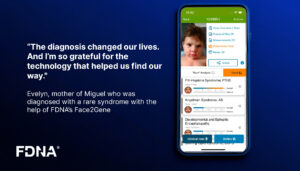Sandra Mesri, founder of the advocacy group Apehi, suffers from a condition called Acromegaly, a rare disorder that occurs when the body produces too much growth hormone (GH). Just as it often happens with rare diseases, she struggled to find the diagnosis. It took her more than three years to finally get an answer as to what she was suffering from.
“My diagnostic odyssey started when I wanted to get pregnant but was (or we were) having problems achieving it. Over time, we went to a lot of specialists, but it didn’t help. The hormone treatment that was given to stimulate the pregnancy made things worse. Instead of helping it, it caused my tumor to overproduce the growth hormone”. In more than 9 out of 10 cases, Acromegaly is caused by a tumor in the pituitary gland, called a pituitary adenoma, which overproduces growth hormone (GH), and results in increased levels of insulin-like growth factor 1.
Sandra started to have very bad headaches, her feet and hands grew, her nose and mouth widened, she was very tired and gained a lot of weight in a short time. “The problem with this disease is that not all patients share the same symptoms. Also the changes in your body sometimes are very subtle. If you see me one day and then a month or year later, you would notice. But for me or those around me, we could not see the differences”.
She started to go to specialists to try to find some answers, but no one could figure out what her problem was. “I went to eight different physicians, and they would suggest a gynecological problem, hormones, or even a psychological cause. But no one could see the whole picture”.
It took another two years for a physician to point out the possibility of Acromegaly and order blood tests that helped to determine that Sandra was producing too much GH. “It took eight specialists, a lot of money, and stress to find out what I had. The pain caused by Acromegaly incapacitates you; it gets harder to work and to go out with friends. It is a very debilitating disease. But once you have a diagnosis, there are treatments available that will significantly improve your quality of life”.
Studies show that the diagnosis of Acromegaly is delayed in most patients, and prolonged diagnostic delay is associated with increased morbidity and mortality. FDNA is developing a new solution to help healthcare providers arrive at an earlier diagnosis for Acromegaly based on its Face2Gene tool that uses artificial intelligence to detect physiological patterns by analyzing a simple facial photo.
“I remember that I was always alone. You don’t forget that. It was very difficult to live with these symptoms because while I was in bed with pain, I saw my friends getting pregnant, going out and getting promoted at their jobs. And so, probably an AI tool like Face2Gene would have been very helpful. This is a disease that has a treatment. So what needs to urgently improve is the detection rate, the time it takes for doctors to diagnose it. “
After the diagnosis, Sandra went through surgery to remove the tumor and fought for access to treatment that would help her live a normal life. She founded Apehi, a group dedicated to helping others with Acromegaly and other pituitary disease patients have access to treatment. Through her foundation, she is now also helping FDNA collect data and patients’ portraits to further develop the tools to improve the earlier diagnosis of Acromegaly. If you would like to help, please contact support@fdna.com.



